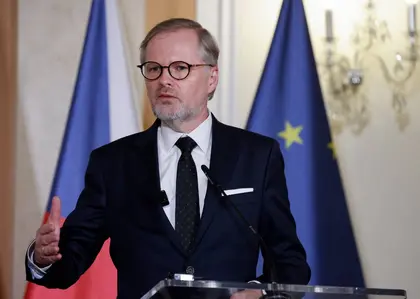The Czech government said Wednesday it would not hold joint meetings with the Slovak cabinet in the coming months as their views on aid to Ukraine diverged.
Both EU and NATO members, which formed a single country until 1993 and whose cabinets have met regularly since 2012, provided Ukraine with substantial humanitarian and military aid following the Russian invasion in February 2022.
JOIN US ON TELEGRAM
Follow our coverage of the war on the @Kyivpost_official.
But Slovakia stopped military aid after Robert Fico became prime minister in October 2023.
Fico has also recently made a string of remarks that have soured ties with Ukraine, questioning its sovereignty and calling for peace with Russia.
"We are convinced that it is not currently necessary to hold a joint meeting of both governments," Czech Prime Minister Petr Fiala told reporters.
The governments were due to meet in the Czech Republic in April, following Fiala's deal with Fico from last November.
The last joint meeting was held in April 2023 when Eduard Heger was Slovakia's centrist prime minister.
Fiala added that although both governments had many topics they could discuss, "we cannot conceal that there are remarkable differences in opinions on some crucial foreign policy issues".
He said another reason was Slovak Foreign Minister Juraj Blanar's "problematic" meeting with Russian counterpart Sergei Lavrov at a diplomatic forum in Turkey last weekend.
Fico said on Facebook that his government would never endanger the "unique" relations between both countries.
"The Czech government has decided to jeopardize them only because it wants to support the war in Ukraine, while the Slovak government is openly speaking about peace," Fico said.
- 'Black hole' -
"Your decision will not affect our sovereign foreign policy," Fico added, stressing that the Czech government was "welcome in Slovakia any time".
Slovak opposition leader Michal Simecka said on X that Fico had "turned Slovakia into a black hole on the map of Europe" within his five months at the helm.
The Czech Republic and Slovakia formed a single country, Czechoslovakia, until a peaceful split in 1993.
Four years earlier, Czechoslovakia had shed the Moscow-steered totalitarian communist rule of four decades in the so-called Velvet Revolution.
The spat over Ukraine was all but palpable last week when the Czech, Hungarian, Polish and Slovak prime ministers met in Prague for a summit of the so-called Visegrad Group of Central Europe's ex-communist EU and NATO members.
While Fiala and Poland's Donald Tusk promoted increased aid to Ukraine, Fico and Hungary's Viktor Orban insisted their countries would abstain from military help.
Slovakia's policy U-turn has also affected the influential Globsec security conference, held in Bratislava every year and criticized by the Fico government.
Its organisers said on Tuesday they would move this year's edition to Prague after 18 years in the Slovak capital.
Globsec head Robert Vass hailed Prague in a statement as "an ideal location to facilitate international dialogue and amplify the constructive voice of Central Europe."
You can also highlight the text and press Ctrl + Enter



